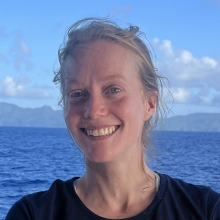
Mary Burkitt-Gray
Tell us about your work/research. What kinds of things do you do?
I work on new ways to detect chemical or physical parameters in the ocean, often using optical techniques. This can range from phytoplankton primary productivity (how much carbon they assimilate during photosynthesis), to ocean pressure, to salinity, to dissolved gases. Some of my time is spent in the lab developing these instruments and techniques, working with other scientists to apply them or design new experiments, and analyzing all the data they collect. Some time I spend at sea deploying these instruments to both study how the new techniques responds, and to use the instruments to learn new things about the ocean. For example, I've spent a lot of time recently using new sensors to map the methane distribution around hydrothermal systems or seeps.
What sparked your initial interest in your career?
I started out in inorganic chemistry during my studies in the UK, and was really interested in how we can use different analytical chemical techniques to understand what's going on in the background. I ended up getting more and more interested in this type of puzzle, so I started working on ocean instrumentation - working on how optical signals could be used to understand everything from phytoplankton physiology to water composition to hydrothermal activity. I love combining the challenges of interpreting these complex signals and the new knowledge we discover about the ocean in the process.
Who influenced you or encouraged you the most?
I had a teacher in school who was so instrumental in me taking up science, because he was always so happy whenever I asked questions and tried his best to answer them. That communication and his genuine interest really encouraged and set me on this path.
What element of your work/study do you think is the most fascinating?
The cool things we can learn by applying fundamental science. For example, so much we know about the ocean is just seeing how photons interact with it. It's crazy that everything comes back to those same basic principles.
How did you get involved with the Ocean Exploration Trust?
I work on the development of oceanographic sensors, and we're testing out some of them during this OET cruise to understand the methane and carbon dioxide dynamics in new areas.
What other jobs led you to your current career?
I've been involved in the ocean a lot over the years, but not as part of my career until more recently. I have scuba dived for over a decade, including volunteering for coral reef surveying, but it was only after I finished my PhD that I decided to also work with my research directly applied to the ocean. My previous job was as a scientist in industry developing ocean instrumentation, and that led to my current job researching at Woods Hole Oceanographic Institution.
What are your degrees and certifications?
PhD in Chemistry - King's College London 2019
Master's in Chemistry - University of Oxford 2013
What are your hobbies?
Anything outside! Kayaking, mountain biking, running, and backpacking.
What advice would you give someone who wants to have a career like yours?
Think about what things you really want to be part of your career, more than just the specific field. For example, do you want to be working at sea, or working in a hands-on job, or working in a small team, or in a lab. There will be a lot of different career options and routes which can all help you to achieve those same goals. So try to keep an open mind about what you truly find rewarding and see where that takes you. When you find something you love, try to keep shaping your work to allow you to do that more, and learn about it from people already in the field.
Expeditions
Mary participated in the following Ocean Exploration Trust expeditions:
